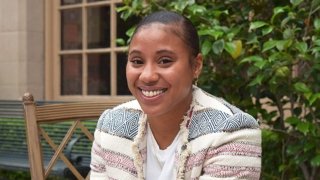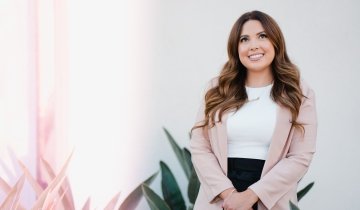Growing up, Alana Brooks was always a secret-keeper, a confidant, a problem-solver.
Buoyant and welcoming, Brooks was the go-to for friends in need. And now, listening to others will be her career.
Brooks graduates from USC Rossier this spring with a master’s in Marriage and Family Therapy, and will be a full-time counselor come June.
“I love to provide that space where you have an opportunity to talk out loud,” Brooks says. “I don’t think a lot of people give kids the space to express themselves and understand who they’re becoming.”
Now, of course, her friends may only be more drawn to confide in her.
“I’m going to have to start charging people,” she says with a laugh. “I have my master’s from USC now!”
Wherever the most need is
Born in Berkeley but raised in Long Beach, Brooks is the daughter of Oliver, a pediatrician, and Lisa, a community banker.
In her childhood—”I had a big personality”—Brooks explored interests all over the map, nurtured by her parents: cooking, Girl Scouts, nine years as a competitive gymnast. But by the time she graduated from San Diego State University with a psychology degree, she knew what she wanted to do: Join City Year. Find the place with the greatest need. Make a difference.
City Year, a nonprofit AmeriCorps initiative that places young adult tutors, mentors and role models in high-needs schools, had just launched a program in Sacramento, and Brooks dived into the work, falling in love with the school site. When an opportunity arose in Washington, D.C., Brooks took it, serving in the nation’s capital for three years.
Southeast Washington is almost 100 percent Black and a prime example of systemic inequity. It has more than 80 percent of the city’s food deserts and unstable access to high-quality health care, among many other issues Brooks points to as creating cycles of disenfranchisement.
With the same determined outlook that brought her to City Year, Brooks applied to graduate school—in fact, she applied to only one graduate school, connecting with USC Rossier’s equity-focused mission.
“Mental wellness is a big piece of taking that step toward equity,” she says. “Your lack of self-esteem might stop you from applying to that job. Or you might be prevented from understanding how childhood trauma stunted your growth. The brain is so vital to our being, I can’t imagine anything more powerful than working with someone’s mental wellness.”
All ears
After training at San Pedro’s Guidance Center for her practicum, Brooks applied for, and received, a full-time position there as a clinician.
While Brooks has always loved talking to people, she has had to adjust on some fronts, noting her work on tactfulness.
“I would never tell a parent they’re doing something wrong. I’ve tried to learn how to tell a parent, ‘This is what’s going on, and if we want to see a change in your child, it’s going to take your own effort as well,'” she says. “The therapy space is sacred and I want them to trust me.”
As for using the counseling skills she’s learned on her own parents, Brooks says there’s a reason therapists aren’t therapists for their kin.
“Sometimes they listen,” she says, “and sometimes they say: Alana, just go.”




